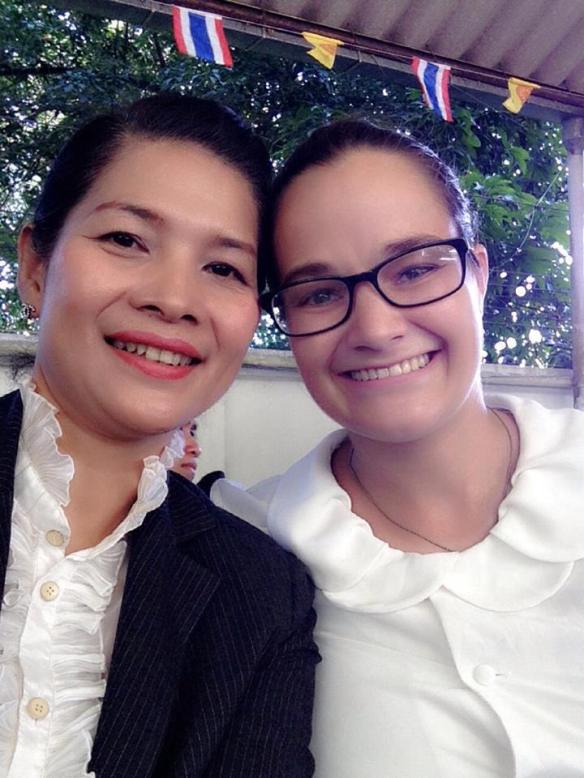Searching for My Teaching Groove
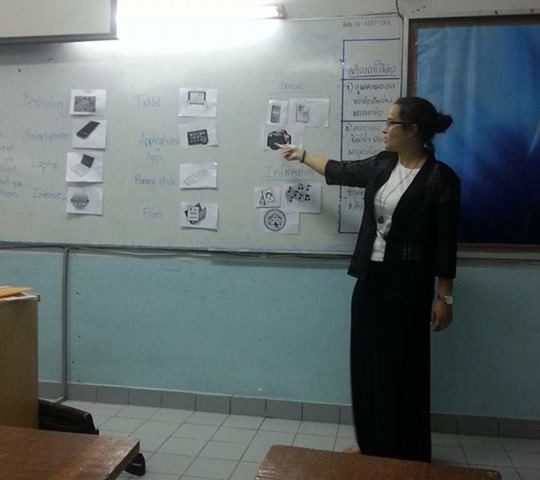
Monday morning, November 11th, I drove to work on my bike for the first time. It was a little nerve racking, but also enjoyable. My commute was shorter by about ten minutes and I was able to listen to a book on my iPhone while I drove. The night before I had prepared my lessons for the week and I felt my expectations were more realistic. I was able to make adjustments based on what I had learned the previous week when I was implementing my first lessons.
Upon arriving, I heard from my agent and someone from the agency came to sort out my schedule. He let me know they would be rearranging my classes to mix some together to ensure I taught fewer periods. He also said I would not be required to run the English Club and after I finished teaching each day, I could leave instead of waiting until 3:30. I was worried about having larger class sizes, but at least I would have a bit more time in between lessons to breathe. Therefore my new schedule had 25 periods with 31 different classes; luckily I can use some of the same lessons. So each week I only have to prepare three different lessons: 1 for M 4 – 6 and the vocational classes, 1 for high vocational, and 1 for M 1 – 3. Unfortunately this does mean I have to teach one lesson 17 times!!
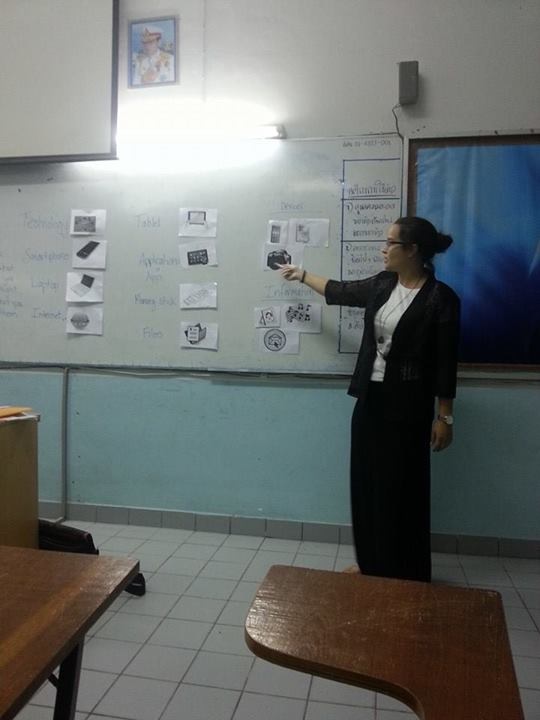
Technology lesson for a college class (yes a student took this and posted it on Facebook during class, at least the lesson was related to technology devices and applications)
During my classes on Monday and Tuesday I found myself losing excitement for the lessons and carrying out the vocabulary practice was very monotonous for me. However, it was advantageous for these students because I already knew how much time to spend on each portion of the lesson and which sounds they would struggle with on pronunciation. I have two college classes on Tuesdays, so I was able to do a new lesson. However, I quickly learned they know the same amount, if not less, English than the younger classes.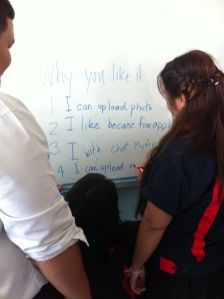

Starting on Wednesday I would be seeing my classes for the third time. It took a long time for the office to make copies of the worksheets I had previously created, so instead of using them as production activities they became a test. I knew it would be important to revisit the vocabulary and ideas I had presented the previous week, so I created some games to reinforce them before giving the test. Some of the students really enjoyed them, while others chose to be disengaged. With one game, the students threw around a ball while I played music. When I stopped the music, I would ask the student holding the ball a question and he/she would have to answer. I used a popular Thai song that I often heard playing in the streets or at bars and the students appreciated it. Another involved them having to rearrange words into a question and answer dialogue. 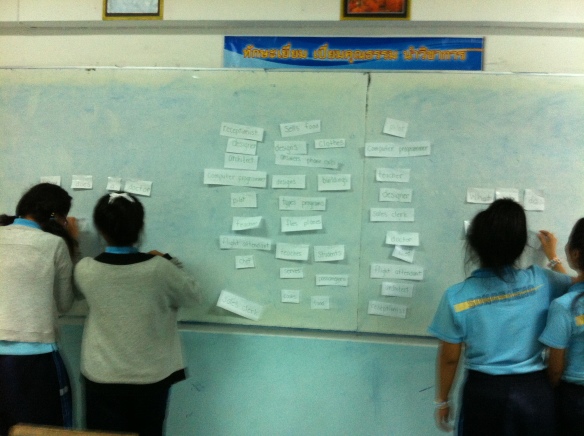 After giving and correcting the first few tests, I realized how much the students copy from one another. With nearly 40 students in some classes, it is impossible to prevent them from copying. Also, since they can speak another language they can tell one another the answers without me understanding. It was a little disheartening because this prevented me from really assessing who understood and who did not.
After giving and correcting the first few tests, I realized how much the students copy from one another. With nearly 40 students in some classes, it is impossible to prevent them from copying. Also, since they can speak another language they can tell one another the answers without me understanding. It was a little disheartening because this prevented me from really assessing who understood and who did not.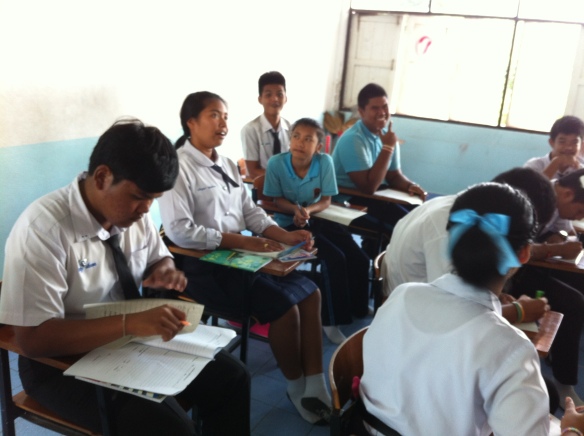 Thursday was very difficult. I know it will be my hardest day each week. By my fifth class, I have M 1/1 and they are 13 years old. It is a very large and rowdy group. My last two classes are M 2/1 and M 2/2. It is interesting how extremely different these two groups are even though they are the same age. M 2/1 stays on task, write in their notebook without being asked, and all participate. M 2/2 students mostly goof off, laugh, mess around, and have to be told repeatedly to write in their notebooks. I need the most patience for these afternoon classes, but I am so exhausted as it’s the end of the day and the end of the week. I really need to figure out a way to have more energy with them and how to make the lessons interactive to elicit more English from them.
Thursday was very difficult. I know it will be my hardest day each week. By my fifth class, I have M 1/1 and they are 13 years old. It is a very large and rowdy group. My last two classes are M 2/1 and M 2/2. It is interesting how extremely different these two groups are even though they are the same age. M 2/1 stays on task, write in their notebook without being asked, and all participate. M 2/2 students mostly goof off, laugh, mess around, and have to be told repeatedly to write in their notebooks. I need the most patience for these afternoon classes, but I am so exhausted as it’s the end of the day and the end of the week. I really need to figure out a way to have more energy with them and how to make the lessons interactive to elicit more English from them.
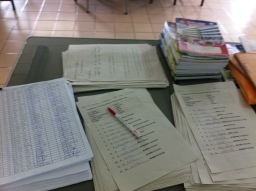
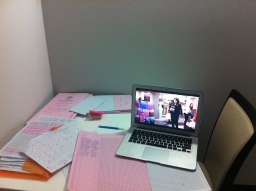
All these tests, meant a lot of grading. Before I graded, I had to write all the students’ names in the grade books. This was a bit difficult because I had a list of their names in Thai. The students had to write their names in English. Many of them pulled out their ID cards to copy or flipped to the front of their book. A few students handed me their pen and said their Thai name… expecting me to phonetically write it. Oye.
Friday was very hard for me personally. All week students and teachers had been talking about the upcoming Saturday. The school would be doing a parade and marching to a local temple to raise money for the monks. Many students skipped class to prepare in various ways: practicing dancing, collecting money, decorating donation containers, etc. Friday afternoon my last two classes were very disengaged. My last period class was meant to take their test. The students arrived 15 minutes late, were slow to start the lesson with me, and when there was 10 minutes left I was about to hand out the test. They all protested saying they had to go to the temple right then. I tried to administer the test anyways and explain that they still had 10 minutes, but it was a losing battle. I ended up walking out very frustrated and went to the bathroom to cry. I felt misunderstood and like they were taking advantage of me. I went to my office and saw that students were beginning to gather around in the assembly area, however not all the classes were there and it confirmed my suspicion that they just used it as en excuse to end class with me early. I explained the situation to one of the Thai English teachers, but she just responded with “Never mind.” So, I tried to shrug it off and went down to see what was happening.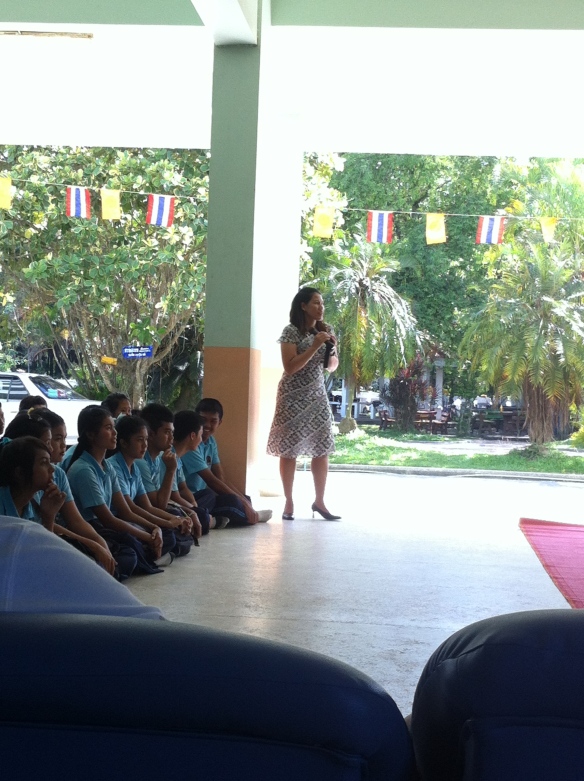 It turns out that monks were visiting to lead the school in a prayer and to accept their offerings of money and other items. I had no idea this would be happening (I have no learned I am rarely informed of happenings at the school, so I ask a LOT of questions now), but went along with the flow. I watched as the students sat quickly inside the open space near the stage, and I situated myself near the other teachers in chairs. The students that do not practice Buddhism were sent upstairs to the library to wait for the service to be over. It is very interesting how often Buddhist rituals are carried out at the school. Even though all the teachers and students are not Buddhists, it is still a large part of the school community.
It turns out that monks were visiting to lead the school in a prayer and to accept their offerings of money and other items. I had no idea this would be happening (I have no learned I am rarely informed of happenings at the school, so I ask a LOT of questions now), but went along with the flow. I watched as the students sat quickly inside the open space near the stage, and I situated myself near the other teachers in chairs. The students that do not practice Buddhism were sent upstairs to the library to wait for the service to be over. It is very interesting how often Buddhist rituals are carried out at the school. Even though all the teachers and students are not Buddhists, it is still a large part of the school community.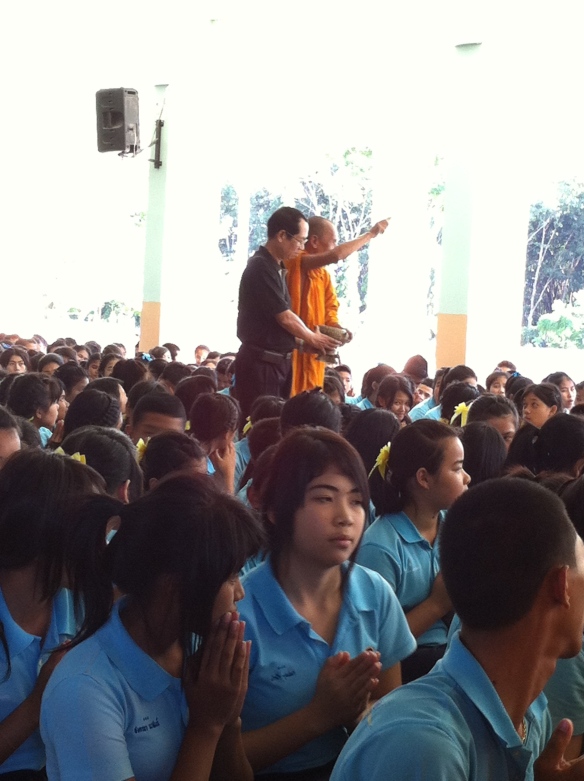 For the next hour and a half, I watched as the monks, teachers, and students chanted. It was interesting to watch and I was grateful to be a part of it. The students seemed appreciative of my participation as well. They waved and smiled when the monks took a break from chanting. After the monk blessed us all with water, the event finished up. P Juliette invited me to join the students the next morning as they marched through a village and to collect money and give their offerings at a local temple. This is the Kathin Festival, which coincides with Loi Kratong. I agreed to meet her around 7am at the school.
For the next hour and a half, I watched as the monks, teachers, and students chanted. It was interesting to watch and I was grateful to be a part of it. The students seemed appreciative of my participation as well. They waved and smiled when the monks took a break from chanting. After the monk blessed us all with water, the event finished up. P Juliette invited me to join the students the next morning as they marched through a village and to collect money and give their offerings at a local temple. This is the Kathin Festival, which coincides with Loi Kratong. I agreed to meet her around 7am at the school.
